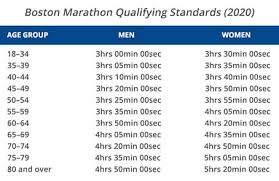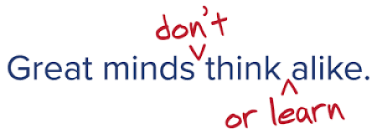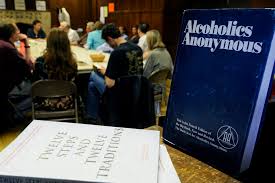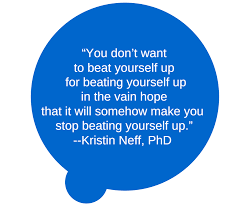At the risk of making a tasteless personal revelation, I am going to disclose that:
- I have a tough time learning language. My linguistic ability is modest; my motivation more so. In theory, in would be awesome to be able to communicate in Spanish. In practice, my brain bursts into flames. The next day after a lesson, the majority of the vocabulary has taken the last train for the coast. I seldom remember nouns. Verb tenses are a bridge too far.

- I occasionally open a cabinet door in my kitchen wondering what became of all the plates and why there are suddenly glasses and cups on these shelves instead. I have lived in this house for 24 years, yet I frequently stand befuddled in a kitchen that has not moved. My spatial sense is poor. I am constantly looking for things. I am intimately familiar with the expression, “if it was a snake, I’d be dead.”
- I have never qualified to run the Boston Marathon. Edison knew 1000 ways not to make a lightbulb. I am personally familiar with 18 ways not to complete 26.2 miles in the requisite time. In 1982, I failed to complete the course in two hours 50 minutes. In 2007 I was not able to run sub 3:35. The age of the runner determines the required finishing time. In 2021, I will be allowed four hours and five minutes. I can state without fear of contradiction that I will not be able to break 4:05 in the 65 to 69 year age group.

There are other flaws and failings. As a young man, I committed dating misdemeanors: I exchanged emotional intimacy for physical. As a parent, I sometimes put my own needs in front of those of my beloved children. I have occasionally let down my friends, my family, my clients. The above admissions are enough to give a flavor of a lifetime of imperfection.
Why the acknowledgement of deficiencies? Usually, “I’m no good at…” is a cry for the response of, “Yes, you are!” I’m not making these disclosures as an unrepentant yowl for “You can run faster if you want to,” or “put a note on the cabinet to identify where the dishes are” or even, “you’re a good guy.” Nor am I asking forgiveness from my readers. As always, I want to make a point about our kids.
But first a note about the difference between self esteem–a buzzword in education and parenting–and self compassion, and examples from the world of learning differences and addiction.
The number one predictor of academic success for students to learn differently is whether or not they can acknowledge, embrace, and articulate their needs. Those in denial – – There’s nothing wrong with me, I just need to study harder – – do not prevail. Whereas those who say, “I better take advantage of extra time” or “I need to see my math tutor” have a better chance. Could it be argued that students who allow that they have issues with their learning style are also more in touch with accepting themselves for who they are?

Those suffering from substance use disorder frequently have past actions of which they are not proud—crimes, betrayals, prevarications. Many addicts in recovery have put a wife, a house, and two children up their nose. Alcoholics Anonymous meetings resound with stories of failed marriages, destroyed relationships, and imploding businesses. In recovery, people say, “Boy, did I mess up. But I own that now. I’m trying to accept my past, make amends, and move on.”

Self esteem suggests that folks feel good about themselves regardless of their accomplishments. Self compassion proposes that there doesn’t have to be a reason. It’s not about the controversial trophies for coming in last. Contingent self-worth is a hard deer to hunt, a receding finish line. Loving yourself for who you are is a better plan.
Help your kids love themselves for who they are rather than what they do. Your children won’t have low standards and commit crimes as a result of your unconditional, positive regard. They will direct your acceptance inward. They will have a better chance of being content as a result.
Dr. Kristin Neff in her wonderful Self-Compassion: The Proven Power of Being Kind to Yourself likens contingent self-worth to addiction. Getting complements or winning competitions is like “chasing after that initial high, but as with drugs or alcohol, we build up a tolerance so that it progressively takes more and more to get our fix.”

I’m going to try to forgive myself for past imperfections. I’m not going to repeat mistakes but I’m not going to blame myself endlessly either. I’m also going to forgive myself for not measuring up to some arbitrary standard. I understand that the Boston Athletic Association has to limit the field to 30,000 runners out of the 500,000 folks who ran a marathon in this country last year. I may never be one of them, but I am going to enjoy a beautiful South Florida morning, plodding along, telling the karate Monkey Joke, having a laugh with my running buddies. When I get home, I’m going to have a delicious, tall drink of ice water. Whether or not I have to open three cabinets to find a glass.




4 thoughts on “Self”
Wonderful article! As someone who is both in Twelve Step recovery and whose ADHD persisted through adulthood, I sometimes forget the need for self-compassion and escaping the trap of contingent self-worth. Thanks for reminding me of those essential qualities for survival, let alone success.
Congratulations on a day, Old Friend. Good for you.
And although I haven’t seen you in person in 40-something years, I am going to go on record as saying you have a wonderful heart and an exceptional brain. Here’s to accepting ourselves for who we are, not what we do, in our 60s!
…I agree with the others AND had to look up the Karate Monkey joke. Please add me to your list of victims. LOL.
…Now how do I find my way to the darn kitchen?
Of all these inbox gifts – ultra appreciative of this one. David, this is Writing that Resonates and inspires me to think, feel, and wonder… blAke